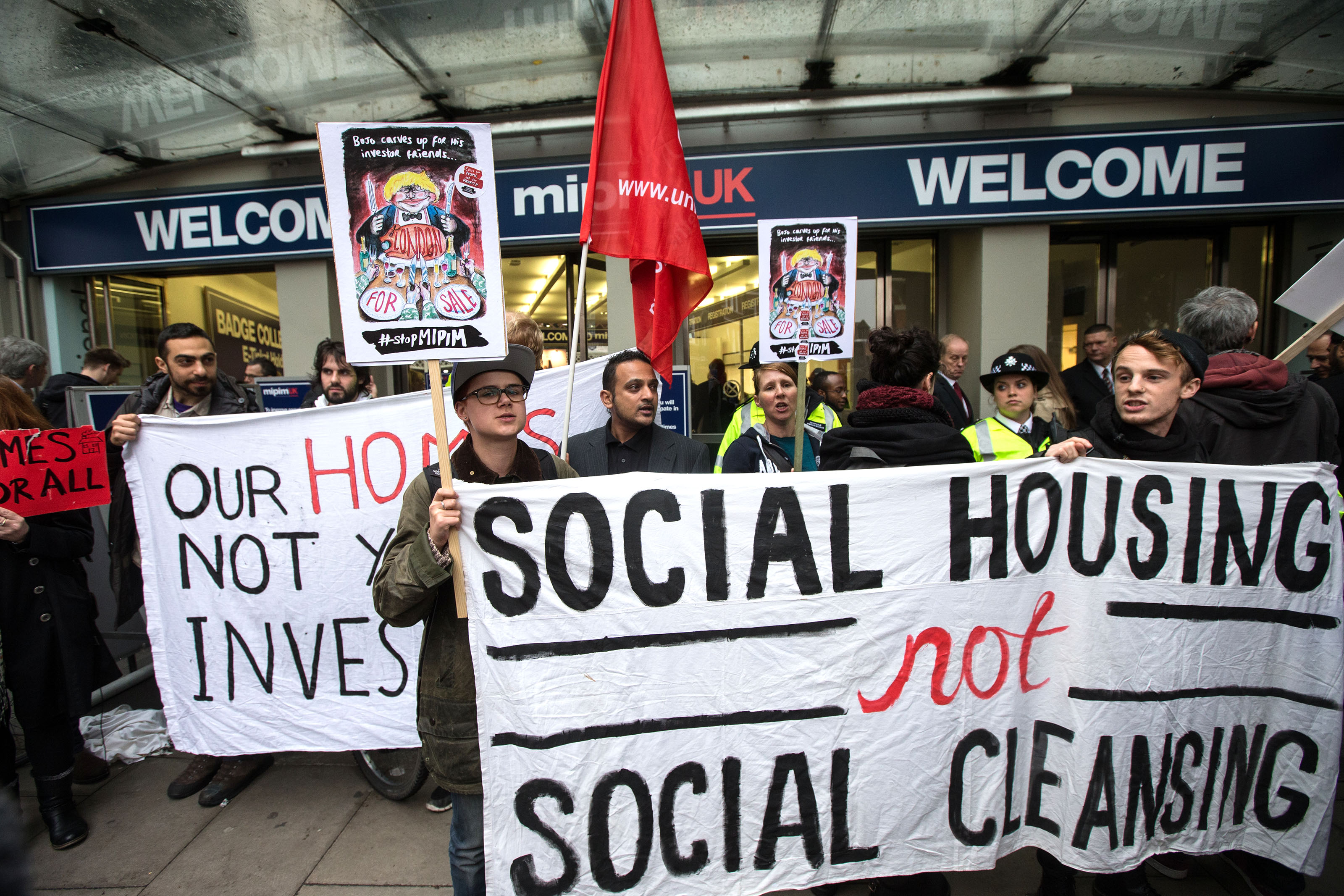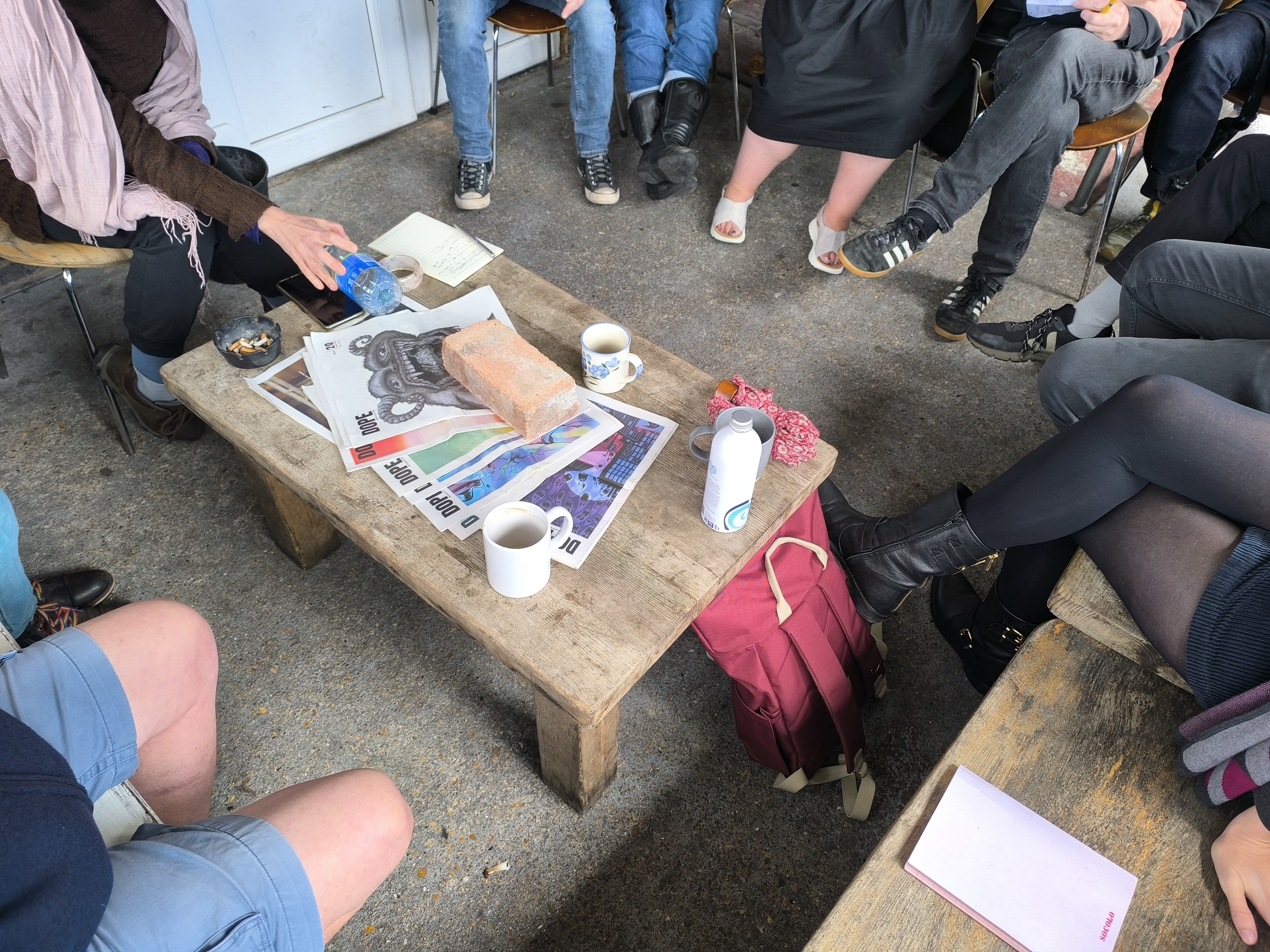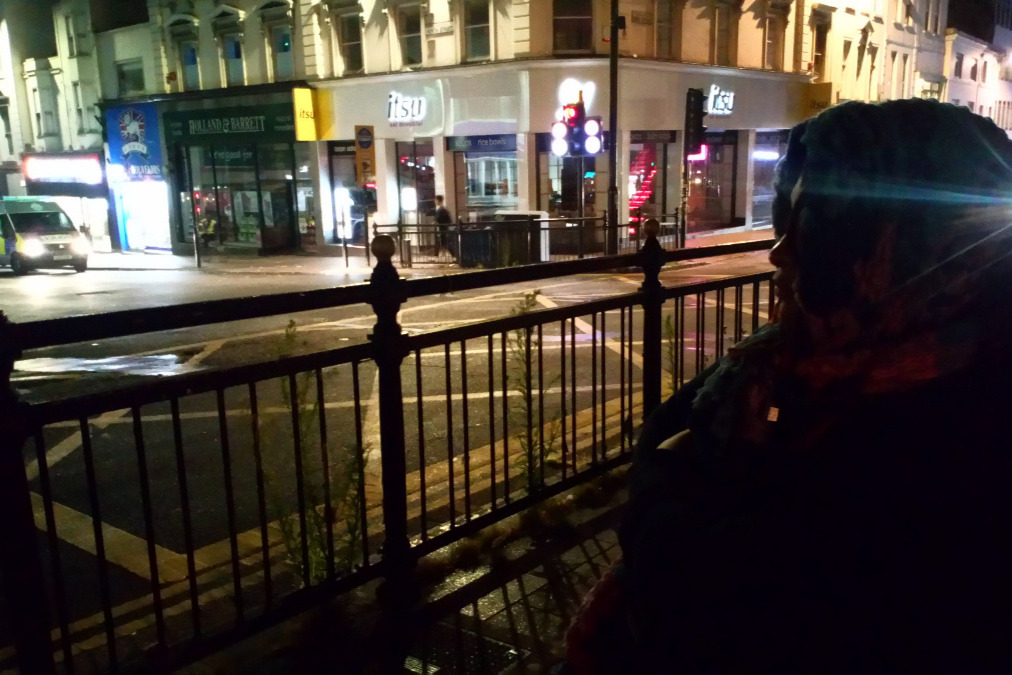On 15th-17th October, the international property conference MIPIM came to London for the first time. Mayor Boris Johnson welcomed developers, investors, public and private property owners (including local government,) and others to a gathering of buying and selling two of capitalism’s most enduringly popular commodities; land and buildings. Between 15th-20th of October, the Radical Housing network (a London umbrella of 19 mainly local organisations) co-ordinated in or participated in a number of actions:
- A noisy and confrontational protest which saw MIPIM temporarily closed to delegates (although it didn’t manage to #blockboris)
- ‘Homes for People, Not for Profit! ‘, a 2-day ‘counter-conference’ of activists, researchers, interested people and foreign visitors from the European Action Coalition on Housing/ Right to the City
- A successful morning eviction resistance in East London
- The distribution of 40,000 copies of ‘The Standard Evening’, a spoof newspaper with a front cover about Boris’ shock plans to build and regulate housing in the capital, and loads of true stuff
- A ‘Radical Housing’ bloc on the TUC demo, accompanied by the E15 Mothers campaign, Plan C and some more rabble-rousers.
I was really happy that I was to take part, listen, ask questions and speak on one of the panels at the conference, which the organisers reckon over 600 people attended over the two days. In this piece are some reflections about where this movement (if it is one) has come from, where it’s at, and where it’s going, and some questions it raises about organisation, ideology and demands. I’ve written this piece both as an insider and an outsider. I’ve lived most of my life in London, though I don’t at the moment, and I organise around and research housing and gentrification and I’ve worked as a paid organiser. However, I don’t currently participate in the RHN, London or European housing groups.
Different struggles, different means, different ends
Most of the counter-conference attendees that I spoke to are involved in organising in and/or researching housing and ‘right to the city’-related struggles. A good many of them were participants in the event too. It felt like a group of people thickening relationships, drawing new people in, learning and reflecting together. I chose sessions where I could learn about specific housing/ urban struggles in London and beyond. Often I felt that some conversations needed to be more structured and nuanced. One of the sessions I went to was entitled ‘Blocking Evictions; reclaiming the city from capital and the state’. However, the questions of what it means to reclaim the city from the capital and the state were not directly addressed. It would have been useful to ask each group in turn – from London, Spain, Turkey, the Netherlands, France, Romania, Poland and Germany – what their relationship to the state and capital is, and, accordingly what demands they make, and what territory they fight on. Not all the groups represented, I think, would describe themselves as anti-capitalist or anti-authoritarian. Obviously, they had different demands of housing. Some wanted more council housing, others a better-regulated private sector, and so on. The emphasis of the E15 Mothers’ campaign, for example, of social housing as a right, and a demand to the state to defend and extend the provision of social housing, is quite different to, for example, the campaigns to protect slum/informal housing in Turkey, or the PAH (mortgage-holders movement) in Spain, where general anti-austerity unrest and mortgage laws combine in a movement to assert the rights of owners over finance capitalism (in the form of banks).
London is in many ways the worst place to get securely and affordably housed in the UK, but it’s clear that the general housing situation is more desperately insecure in many of our neighbour countries. In terms of broadening the struggle, it seems clear that a movement like the PAH in Spain or the mass-squatting/ general civil unrest in Italy may not kick off here. Our Italian and Spanish attendees both pointed out that in their countries everyone knows someone who’s been evicted and almost everyone is sheltering and supporting someone else. Meanwhile, activists in Poland and Romania focus on tenant eviction resistance against an aggressive post-communist reprivatisation policy that literally throws people out on the street. This doesn’t mean we can’t all share tactics and perspectives across borders but it does mean, I think, that we shouldn’t wish for the struggle of Southern Europe without examining our own conditions and breaking points first.
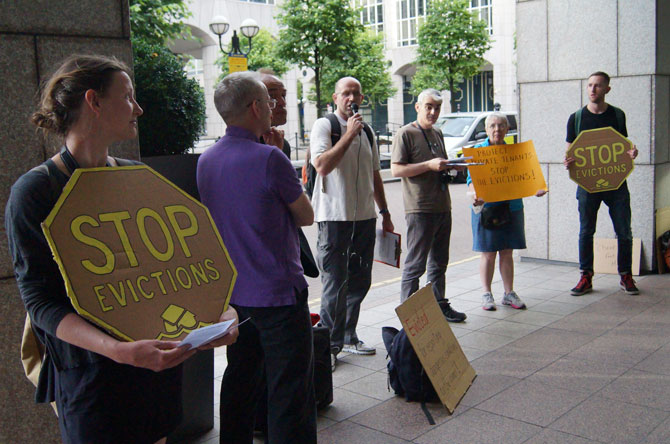
Housing struggles in London
This London housing movement has a long history, and its latest incarnation has been a long time coming. Several member groups arose from squatting and co-operative groups many decades ago. What stood out to me was the broad age range of those present. Many people were in their 20s or early 30s, but there were a good handful of those 50+. I spent a long time talking to a tenant in his forties from an estate in West London which is currently undergoing ‘regeneration’ and displacement of tenants. A long-time Labour voter, he told me that it was the moment that he saw the notice saying that – contrary to promises – they would not be allowed back, he knew that political parties ‘ just weren’t representing me any more’. He got in touch with RHN, and as we talked, beamingly welcomed newcomers through the door. I also spoke to a woman who lives as a ‘property guardian’ licensee. She became involved in her local housing activist group because as well as being anxious about her rights and treatment as a licensee, she was appalled at the treatment of current and former tenants on the estate she lives on.
The newest and most numerous organisations in RHN are private renters’ groups with different emphases with regard to who they represent, their political analysis and their tactics. Some have pursued a stronger track of lobbying and engagement with sympathetic councillors and officers, others have focused more on stunts such as an occupation/party in local luxury flats , or ‘direct action casework’ with individual housing issues; but most blend all of these. Several groups successfully lobbied their local authorities not to attend MIPIM, including Hackney. The times have changed, but many of the demands stay the same, many oppositional – stop selling council housing, save our homes, stop evictions – but also proposing, as in – homes for people not profit, build council housing, homes for all.
As with much activism, a large proportion of political antagonism/engagement is directed at local government. In London, this seems partially justified given the very particular flavours of different boroughs over time (no coincidence that historically Labour boroughs have far higher levels of social housing). Yet it is also central, Labour-led boroughs such as Lambeth and Southwark who are now among the most keen to privatise their housing, both in terms of selling their public housing and forcing social tenants into the private rented sector and entering into crushing PFI (Private Finance Initiative, of which more below) deals which wipe out social housing provision as they go. As council budgets continue to shrink as Whitehall carries on with the so-called ‘deficit reduction’, they face severe criticisms and antagonism from some of the people they (genuinely, in some cases) are trying to protect and support. However, this recent case from Housing Action Southwark and Lambeth (HASL) highlights both personal nastiness and a policy commitment to social cleansing rather than social housing.
It’s not just about housing
Obviously, the provision of housing in London is not a minority issue. In Hackney, for example, 98% of landlords won’t accept people on housing benefit, and even those on or above the median wage pay more than half their income to their landlord or a bank (compared to a European average of around 23%). However, most of the issues touched on in presentations went beyond housing. The most obvious of these is the question of privatisation. In this way, MIPIM (rather than, say, a Government summit on house-building) was the perfect foil. The demonstrators outside the conference included those against hospital privatisation and retail developments. Housing PFI is only a tiny part of the picture; it’s roads, hospitals and anything we might still quaintly regard as ‘public’ that are increasingly owned, managed and funded by the private sector. And it’s quite evident that in struggles across Europe, housing activists are drawn into wider contestations about retail, public space and racism/anti-immigrant politics.
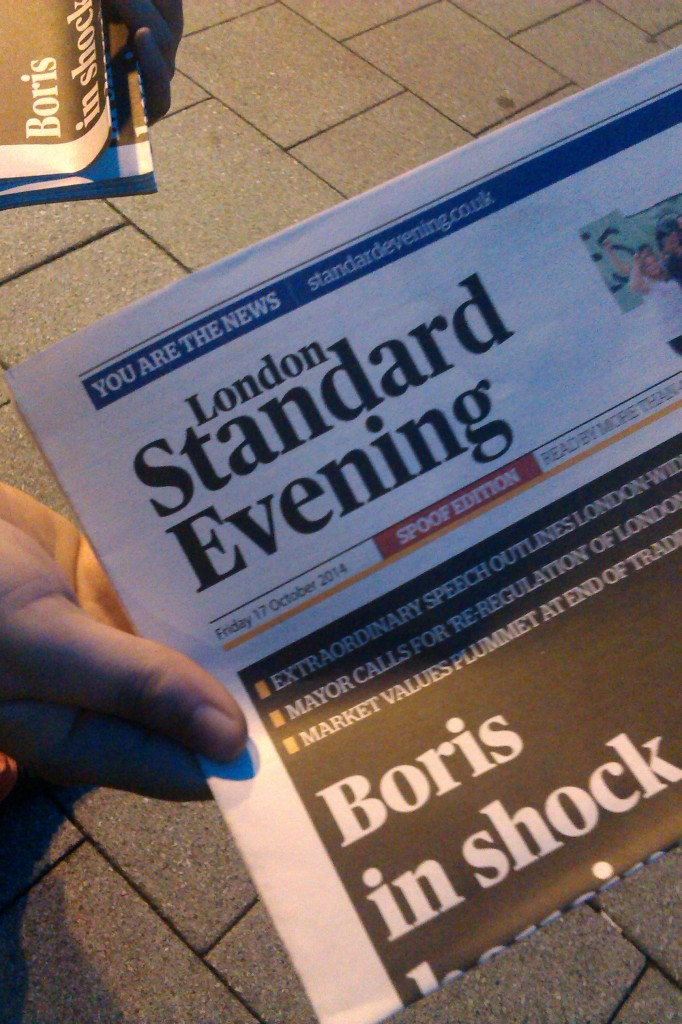
Groups vs Umbrellas?
At the moment, the RHN is quite an open group – as far as I can tell, there aren’t any conditions for joining, apart from that you are involved in housing struggles that fit with their principles. It’s grassroots and there are no paid organisers, no office, and so on. The relationship with other organisations is interesting. For example, the Unite Community branch in London has been supportive at certain points, and the diversity of groups represented on the demonstrations (both at MIPIM and TUC) shows the relationship to more formal political groupings such as the Revolutionary Communist Group. It seems important to that – for now – RHN maintains its position above/beside these broader left groups and has its own member-led direction. On a political front (cross-tenure approaches, autonomous groups using their preferred tactics) it looks like it’s leaving more formal organisations behind. But to grow, it may have to rely on resources (money, space, in-kind help) of larger and more formal organisations. There’s a tension there, as I’ve found in my own organising around welfare and housing. Outside organisations have a habit of branding actions and publications as ‘theirs’, rather than ours.
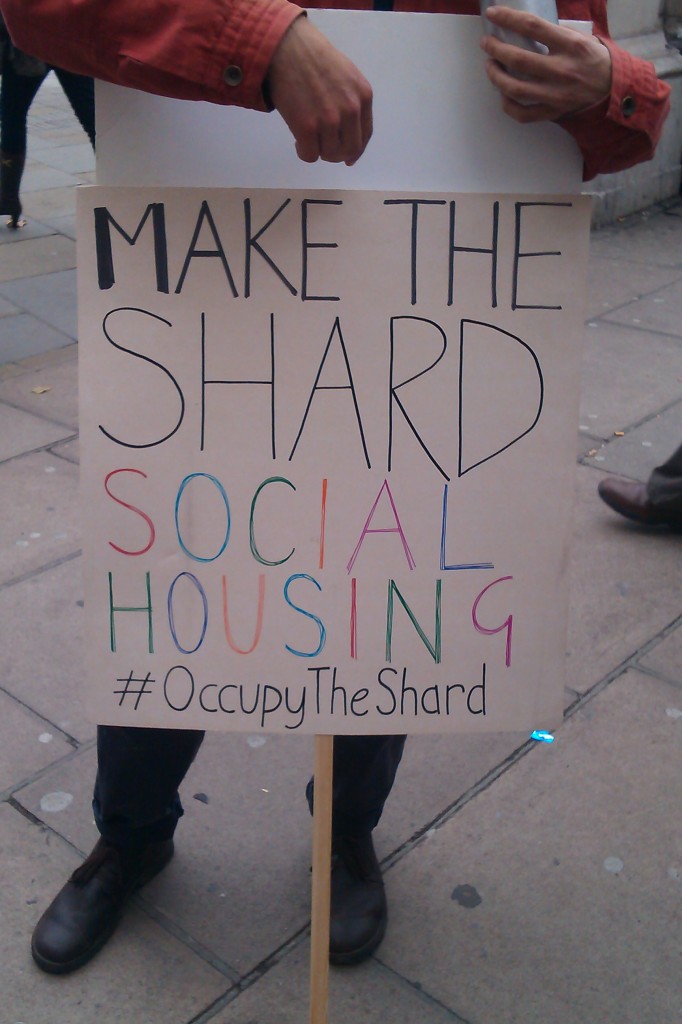
Making demands and making plans
Over only a few years, Radical Housing network has become something impressive and inspiring. Its member groups seem to take genuine cross-tenure approach, a diversity of tactics and a pragmatic engagement with the local state which gives quick wins and builds power. I offer a few constructive/critical thoughts on what a London housing movement could do now. Essentially they all relate to what kind of political project a housing movement is, and whether it can be a space to create plans as well as demands and contestations.
a) The state as problem and solution
As one member of the RHN said in a recent presentation, ‘local authorities are the unit through which we organise’. This engagement with the local state is obviously a pragmatic geographic decision as much as a political one, but if most of the housing groups are doing that, then it might be helpful for them to reflect critically together upon their strategies, and as well as sharing strategies and tactics, think about the extent to which their politics are shared. As I said above, I think at these gatherings we can have more abstract discussions about the nature of capital and the state (and neither of these are, of course, monoliths) grounded in the concrete and particular reality of certain struggles. Groups seem to be increasingly teaming up on actions and strategising, and as E15 Mothers have said to Our West Hendon (a group currently taking direct action to block private house-building on an estate), ‘your fight is our fight.’ London local authorities are not all the same, but I’d love to see a more detailed power analysis of how RHN members could and do engage with the state.
b) Nailing your colours to the mast
Following on from above, it’s not explicit in the RHN’s self-description that there is no genuine solution to the London housing crisis – that we all have autonomy and security in appropriate housing – under capitalism. Without being in the network, I can’t comment as to the extent its members or member groups would agree. I understand the need to organise collectively around what affects us in common, which may mean approaching the topic gently, but housing movements should assert that ‘the housing crisis’ is the crisis of capitalism, in which surplus profit must be reinvested to make more profit, and in which the welfare state visions (and realities) of the London County Council no longer make ‘business sense’. This is especially given the particular lure/compulsion to PFI as the local state is starved of money and planning restrictions are removed. At the same time, an anti-capitalist response doesn’t mean everyone has to set up fully-mutual housing coops or squat. But for me, the end goal must and should be a housing commons of the kind that we have never seen in this country – not even in the heyday of council building.
c) What do we want?
In a session on private sector/housing policy/tenants’ movements, one organiser pointed out that there was a possible contradiction in the demands of different groups. While one group is campaigning against social tenants being forced to rent privately, another will focus on making private renting better (mainly by pushing for regulation which lowers rents and forces structural improvements). Another commented ‘We don’t actually want the private rented sector to exist at all – we all want to live in social housing.’ Others commented that they didn’t want to pay rent to anyone, including the state. I suspect most Londoners wouldn’t agree, and that the average social or private tenant wants a lower rent, more control, more choice, and a landlord who meets their obligations. One London housing activist tried to get in under these questions; ‘What are we asking of renting? That it be made better? Or destroyed? Do we all want to be social tenants?’ In the case of privatisation, does being anti-privatisation mean you have to be pro the state? Or is privatisation simply another way of showing what the state is and has become? Does it point to a way the state could be? Against PFI, and for syndicalism/social democracy/full luxury automated communism?
When does this question of overarching politics start to matter? Pretty soon, I reckon. Maybe even now.
These kinds of questions, for me, become more urgent as a movement develops and also regularly checked-in on as strategies and tactics develop. There is also, frankly, no *good* time to ask them, but always. During the talks I heard some canny inversions which I think do and can continue to lead us in a different direction; beyond Plan A of a politics as usual or a Plan B of nostalgia for a welfare state and a middle-income property-owning democracy. For example (of property guardianship), ‘We are not stopping squatting happening – we are stopping renting happening! and, be we renters or mortgage-holders, ‘We are all paying rent to the banks’. These seem to me more discourse-shifting and strategic assertions than the ubiquitous ‘We are the 99%’.
Conclusion – and why housing?
On my panel I was asked to consider why I thought housing was a struggle particularly worth fighting. I think it’s because without a place that through autonomous control, security, and appropriateness we call home, we don’t even have the basis for organising in the world beyond it. It’s also a place where – even in the present state of things – we can exercise and organise a huge amount of power (our labour power, our powers of reproduction and care, our rest and our reflection) and that power can be transformative, again, beyond those walls.
Gloria, Plan C Leeds

